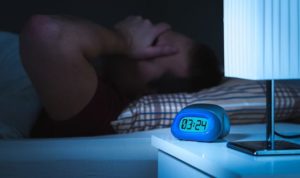 People accessing an online sleep improvement programme provided free in the Thames Valley through the Oxford AHSN reaped wide-ranging benefits, according to a new report. The study found they slept longer, spent less on sleeping pills, had fewer sick days and better mental health.
People accessing an online sleep improvement programme provided free in the Thames Valley through the Oxford AHSN reaped wide-ranging benefits, according to a new report. The study found they slept longer, spent less on sleeping pills, had fewer sick days and better mental health.
The findings are based on feedback from more than 7,000 people who started a Sleepio online programme based on cognitive behavioural therapy (CBT) for insomnia in Berkshire, Buckinghamshire, Oxfordshire and Milton Keynes since October 2018. They were among more than 16,000 who completed an initial Sleepio sleep score test through the initiative coordinated by the Oxford AHSN.
Insomnia is the UK’s most common mental health complaint, with 8-12% of adults suffering from chronic insomnia and 30-50% experiencing insomnia symptoms. Left untreated, insomnia is associated with increased risk of mental health disorders such as anxiety and depression, and chronic conditions including diabetes, obesity, and cardiovascular disease. A recent study by King’s College London and Ipsos MORI found that Covid-19 is having a significant negative impact on sleep, with nearly two-thirds (63%) of respondents reporting that their sleep had worsened during lockdown.
A new joint report from the Oxford AHSN and Big Health, the company behind Sleepio, finds people using Sleepio:
- slept longer – an average of almost six hours extra per week (17% increase)
- reduced their use of prescription medication and over-the-counter sleep aids by 56%
- were 21% less likely to be absent from work due to poor sleep
- had a 70% reduction in anxiety symptoms (72% reduction for depression symptoms).
Additional analysis by the Office of Health Economics based on more than 1,200 patients registered with nine GP practices in Buckinghamshire found projected savings of £106 in primary care costs for each Sleepio user over three years – potentially saving the NHS as a whole millions of pounds. The projected three year savings were:
- £131,000 – across the nine surgeries in Buckinghamshire
- £544,000 – across the whole of Buckinghamshire
- £2.3m – across the Thames Valley
- £56.4m – across England
Clinical guidelines from the National Institute for Health and Care Excellence (NICE) recommend CBT as the first-line treatment for chronic insomnia – but it is not always available due to a shortage of trained therapists.
Tracey Marriott, Director of Clinical Innovation Adoption at the Oxford AHSN, said: “This experiment has demonstrated that digital CBT treatments can be effective and beneficial for patients. Conversations with some of these patients indicated profound changes such as better and more consistent sleep, reduction in anxiety and a marked improvement in their everyday lives.
“The fact that 7,000 people signed up through this study, many who would be considered to have clinical insomnia, shows that there is an appetite for online therapy. It gives patients and clinicians another option other than medication and, given Covid-19, it is a convenient digital method that could be accessed by many from the safety and comfort of their own homes.
“This report represents a rich set of learnings for innovators and NHS systems on how a fully automated digital solution can be successfully implemented at scale. We believe this project represents innovation at its best, benefiting patients, clinicians, and commissioners alike.”
Free direct access to Sleepio in the Thames Valley was made possible by funding from Innovate UK. Chris Sawyer, Innovate UK’s innovation lead for health and care, said: “UK Research and Innovation, through the Digital Health Technology Catalyst, has invested £35 million in projects that will improve patient outcomes, access to healthcare and treatments by harnessing the power of digital innovation. Products like Sleepio demonstrate the very clear value of such investments – improving people’s mental and physical health and quality of life.”
Dr Graham Jackson, a Bucks GP, co-chair of NHS Clinical Commissioners and a former clinical lead for the Bucks Integrated Care System, said: “As a digital product with easy access the use of Sleepio supports the self-care agenda, reducing burden on traditional psychology services and helps patients to avoid seeking a pharmacological intervention for their poor sleep pattern.”
Dr John Pimm Clinical and Professional Lead, Buckinghamshire Psychological Therapies Pathway, Oxford Health NHS Foundation Trust, said: “These results highlight the impact that is made possible through collaborative partnerships across primary care and mental health. Scaling up high potential digital therapeutics like Sleepio offers an exciting opportunity to provide both improved patient outcomes and economic benefits to the wider healthcare system.”
Professor Colin Espie, Big Health co-founder and Professor of Sleep Medicine at the University of Oxford, said: “This study demonstrates how digital therapeutics can help the NHS grapple with longstanding challenges that leave millions every year without access to appropriate treatment. We’ve shown that the ‘treatment gap’ for insomnia can be bridged by providing access to digital CBT, which is safe, effective, standardised and scaleable.
“Interventions like Sleepio can ease the burden on existing services by delivering clinically proven therapy at the click of a button, eliminating waiting times and avoiding unnecessary in-person contact. This is of particular benefit in the midst of the Covid-19 pandemic when the need for remote access to treatment is greater than ever, but in the long run, access to digital CBT for insomnia as an early intervention will help to prevent people’s health needs becoming more complex and difficult to treat down the line.”

